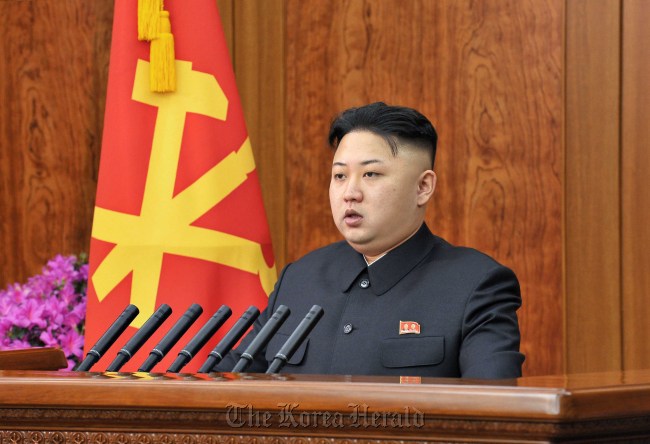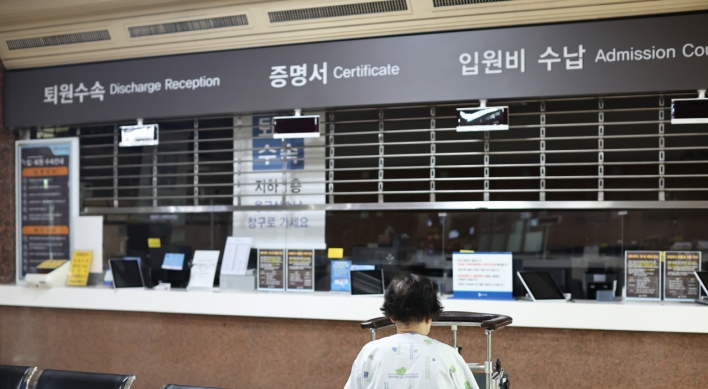Seoul officials are cautiously optimistic after North Korean leader Kim Jong-un signaled his willingness to prioritize economic revival and defuse tension with the South.
Kim on Tuesday made the first verbal New Year’s address by a North Korean leader in 19 years.
With economic recovery being the biggest task at hand, the Swiss-educated leader may try to mend ties with the incoming Park Geun-hye government for industrial cooperation and food handouts, analysts said.
Kim on Tuesday made the first verbal New Year’s address by a North Korean leader in 19 years.
With economic recovery being the biggest task at hand, the Swiss-educated leader may try to mend ties with the incoming Park Geun-hye government for industrial cooperation and food handouts, analysts said.

Seoul’s Unification Minister Yu Woo-ik said Wednesday that though lacking a new vision, Kim’s speech divulged his “willingness to manage the situation” on the peninsula.
“We should steer the inter-Korean relationship with a good intention so that the North can ultimately take the right path,” he told reporters.
Foreign Minister Kim Sung-hwan also emphasized the need for diplomatic efforts and coordination with neighboring countries to push Pyongyang into making “right and wise decisions.”
In the message, Kim Jong-un underlined the importance of boosting agriculture and light industries as “the most important task of building a powerful, prosperous socialist nation.”
Boasting of the success of the country’s Dec. 12 rocket launch, he urged “definitive measures” to drive innovation in the coal and metal sectors and rejuvenate the poverty-stricken economy.
“As North Korea sets economic development as a key domestic policy goal for 2013, the need for improvement in relations with the South will grow as well,” Cheong Seong-chang, a senior fellow at the private Sejong Institute, said in a statement.
“If Park suggests talks be restarted in the early phase of her term, the North seems likely to show an active attitude to recover the ‘five lost years’ during the Lee Myung-bak administration.”
Kim’s touch on “economic management methods” points to a full-fledged implementation of the so-called June 28 guidelines, which entail greater autonomy for farmers and businesses, Cheong added.
His speech was apparently designed to be reminiscent of the relatively well-heeled era of his grandfather, Kim Il-sung, while the younger Kim emulated his look and gestures.
The carefully choreographed address placed greater emphasis on reunification with the South, describing it as “the most urgent assignment for the people that can no longer be delayed.” But this time it did not carry attacks on the Seoul government as before, possibly indicating the regime’s willingness to engage.
“As past records of the inter-Korean relationship have shown, confrontation between the same people brings about nothing but war,” Kim said.
He called for action to resolve the festering standoff and to meet previous bilateral commitments on denuclearization, such as those made on June 15, 2000 and Oct. 4, 2007.
“The message implies a change in direction compared with 2012’s anti-Seoul statement and a recovery of the appeasement stance shown in the 2010 and 2011 addresses,” the state-run Korean Institute of National Unification said in its analysis.
“It apparently expresses expectations for improved cross-border relations in the run-up to the launch of the Park Geun-hye government, and the regime’s intentions to urge the implementation of previous agreements.”
Inter-Korean relations have spiraled downward over the past five years against the backdrop of Pyongyang’s nuclear buildup and Seoul’s reciprocal, condition-laden attitude.
Park, who takes office on Feb. 25, has promised to balance engagement and deterrence in what she calls “trustpolitik and alignment.”
To avoid her predecessors’ failures, Cheong called on the president-elect to draw up a new approach that would lead Pyongyang to shake off its hardline “military-first” policy in favor of economic pragmatism.
But KINU warned against a possible nuclear test and another firing of a long-range missile in the first half of this year, which would almost certainly complicate the fledgling government’s efforts and dampen the mood for reconciliation.
Analyses of recent satellite images showed that the regime has repaired flood damage at its atomic test site and appears technically ready for another detonation.
Defense Minister Kim Kwan-jin also predicted on Tuesday that the communist state would continue provocations in its normally deceptive way this year, urging vigilance.
“Kim Jong-un is expected to keep expanding control over the military to cement his leadership,” the Seoul-based think tank said.
“With the North running a two-track policy, the new government will need to carefully look for the possibility for the resumption of bilateral talks and consider how to solve other issues such as humanitarian assistance and separated families.”
By Shin Hyon-hee (heeshin@heraldcorp.com)





![[AtoZ Korean Mind] Does your job define who you are? Should it?](http://res.heraldm.com/phpwas/restmb_idxmake.php?idx=644&simg=/content/image/2024/05/06/20240506050099_0.jpg&u=)












